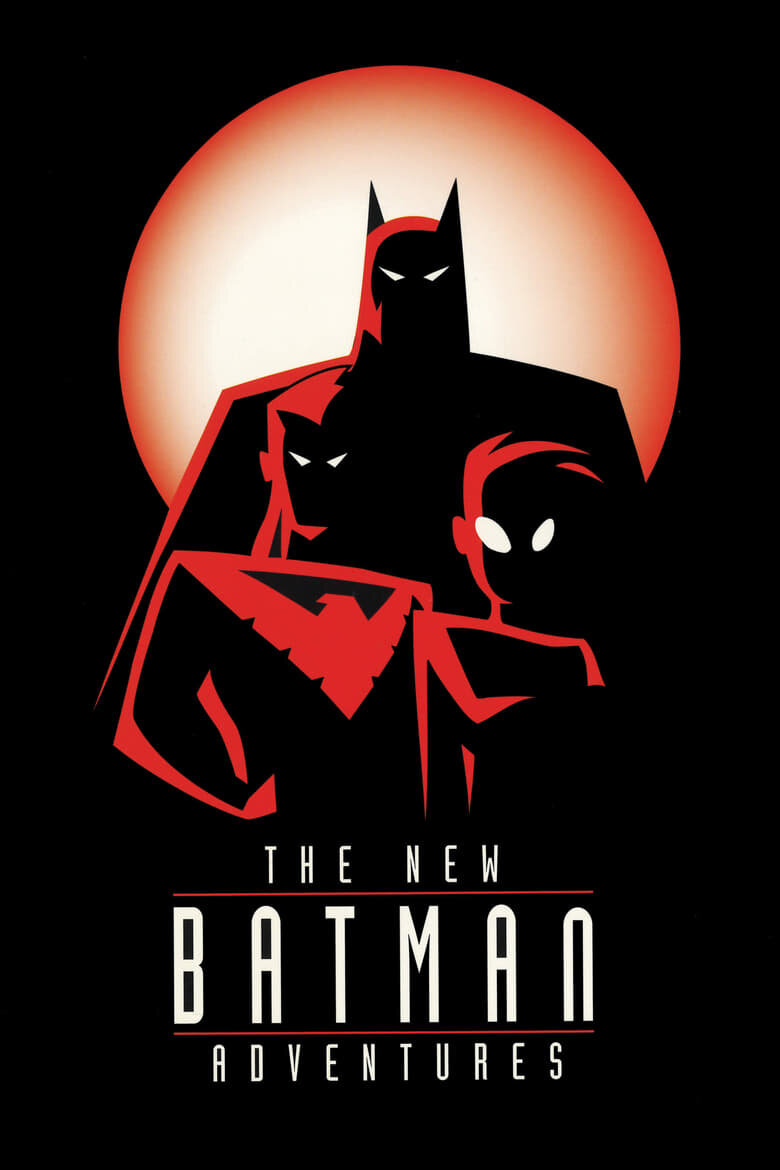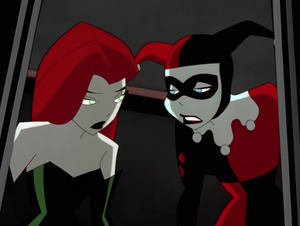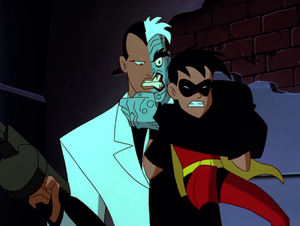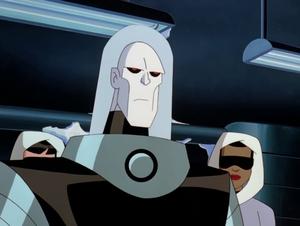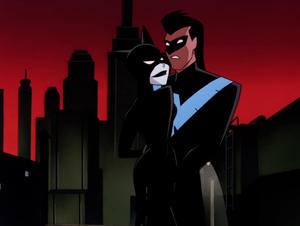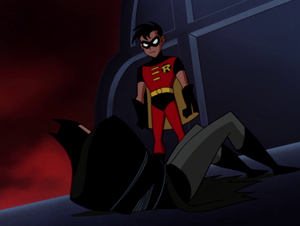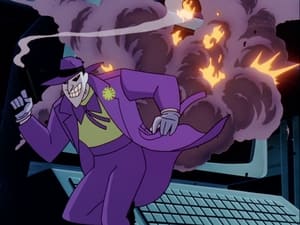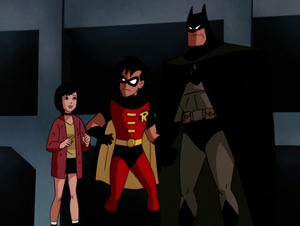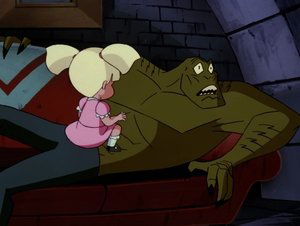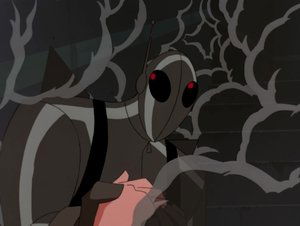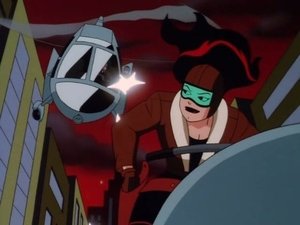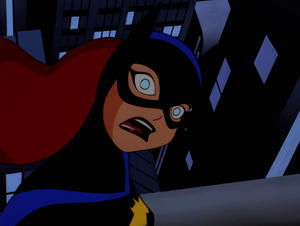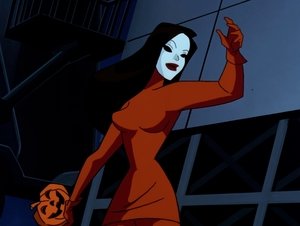The New Batman Adventures
Over the Edge
Season: 1
Episode: 11
Air date: 1998-05-23
Guest stars: Henry Silva,Jeff Bennett,Lloyd Bochner,Liane Schirmer,John Garry,Loren Lester,Robert Costanzo,Tara Strong,Mathew Valencia,Arleen Sorkin,Bob Hastings,Efrem Zimbalist Jr.,Roddy McDowall
During a fight with the Scarecrow, Batgirl is ambushed on a rooftop and falls to her death. Having watched his daughter's demise, Jim Gordon blames Batman for her fate and vows revenge, even recruiting Bane in the process.
"How could you? I worked with you, trusted you. And you never told me? She was my daughter. My daughter."
I liked
The Killing Joke. While that might be considered a controversial opinion in a post-#MeToo world, I thought it was a bold take that walked the edge of what mainstream superhero comics usually wouldn't dare to explore with their romanticized idea of costumed vigilantism. It didn’t flinch from the idea that people like the Joker would push their enemies past their limits in psychologically sadistic, dehumanizing ways. It made the cost of crimefighting feel real, raw, and uncomfortable.
That said, much as I enjoyed many of Alan Moore's works like
Watchmen and
V For Vendetta, I do admit that it doesn't really do Barbara Gordon much justice here. She was a prop—paralyzed, victimized, and used to propel someone else’s emotional arc. A plot device. A body in the fridge, there to push Batman and Jim Gordon into emotional extremes. Her trauma wasn't hers—it was a tool to escalate their arcs.
Then the
animated adaptation came along and did her dirty in a whole new way by inserting a full-on sex scene between Batgirl and Batman. I get the intention—it was supposed to be her final moment of agency before everything went to hell—but come on. It’s still a YIKES when your father figure becomes your fling.
That said, I think "Over the Edge" explored that kind of consequence much better here. Superheroes, especially heroes like Batman, often skirt a razor-thin line between heroics and hubris, and one bad day isn’t just a comic book cliché—it’s an
inevitability. So I'm usually glad whenever a show tackled that subject matter. Even if "Batman: The Animated Series" had explored the theme quite often already to the point of tedium, this particular installment sharpens it into something uniquely personal.
At its core, this is a story about broken trust. The bond between Batman and Commissioner Gordon has always been a weird one—half professional, half unspoken mutual respect—but it worked because of the DCAU’s airtight internal logic. That’s what makes it devastating when that logic breaks. When lines are crossed and trust turns to fury, you realize how much of Gotham’s delicate moral balance was held together by silent, unbreakable assumptions.
Bruce’s grief, Gordon’s rage—it’s all played perfectly restrained. The episode never gets melodramatic. It doesn’t need to. Every word, every silence, carries history. Bruce has always known the risk he took by involving others in his crusade. Even if he acted from love or necessity,
he knew what it meant recruiting child soldiers. The consequences felt real, and when the cost finally comes due, it hits hard because his regrets visualized on-screen felt grounded.
But what truly elevates the episode beyond just another "Batman consequence" message is the reframing twist. Without spoiling anything, let’s just say the story isn’t content with being a grim spiral into despair. It recontextualizes everything in a way that makes it clear: this isn’t about vengeance, or blame, or punishment. It’s about fear—
deep-seated, suffocating fear about the consequences of living in a world where vigilantes recruit children, where secrets erode trust, and where one misstep can shatter everything.
In fact, that fear distorts the events in the episode so effectively that when certain characters begin compromising themselves—morally, legally, even ideologically—it starts to feel surreal. Off. Like a funhouse mirror reflecting Gotham’s worst-case scenario. Even the more bizarre design choices—like Bane’s transformation into what can only be described as a leather-clad gimp with domination tendencies—suddenly feel oddly appropriate once the full picture settles into place. In hindsight, it’s less a visual overhaul and more of a subconscious tell: a repressed fantasy made literal, where fear and authority blur into fetishized brutality. It’s the kind of psychological kink that slips through the cracks when your anxieties have a Freudian slip.
And the brilliance of it is—that absurdity doesn’t break the tone. It
amplifies it. Because when fear distorts reality, it doesn’t sharpen it—it exaggerates it. Every threat becomes grotesque, every consequence unbearable, and Jim Gordon is suddenly bargaining with the Devil. It’s not about realism anymore. It’s about perception spiraling into nightmare logic, where everything is just one twisted step too far. And that's exactly what makes the episode resonate: it captures not what is, but what could be feared—and how that fear shapes the world around it.
That’s the difference between
Over the Edge and something like
The Killing Joke. Here, the story doesn’t reduce its characters to symbols or narrative devices. It lets them feel. It gives them space to panic, to fear, and eventually, to breathe again. The resolution doesn’t erase those fears—but it does offer something rarer in Gotham: emotional clarity. It doesn't tie everything up with a neat little bow, but the closure nonetheless feels earned. The parties involved confront the potential dangers of their roles—not by quitting, not by rationalizing—but by
acknowledging the weight of those dangers and choosing to continue anyway. It’s not heroic. It’s human.
Visually, the episode is top-tier. Direction, music, and animation blend seamlessly with the story’s intensity, delivering some of the best tension and action of the entire series. But it’s the emotional fallout, not the explosions, that lingers.
Overall, if you’ve ever wanted to see what happens when Gotham’s carefully balanced world of masks and trust is pushed to its psychological limits—without cheap theatrics or melodrama—this is the one.
